From confrontation to cautious co-operation
- Published
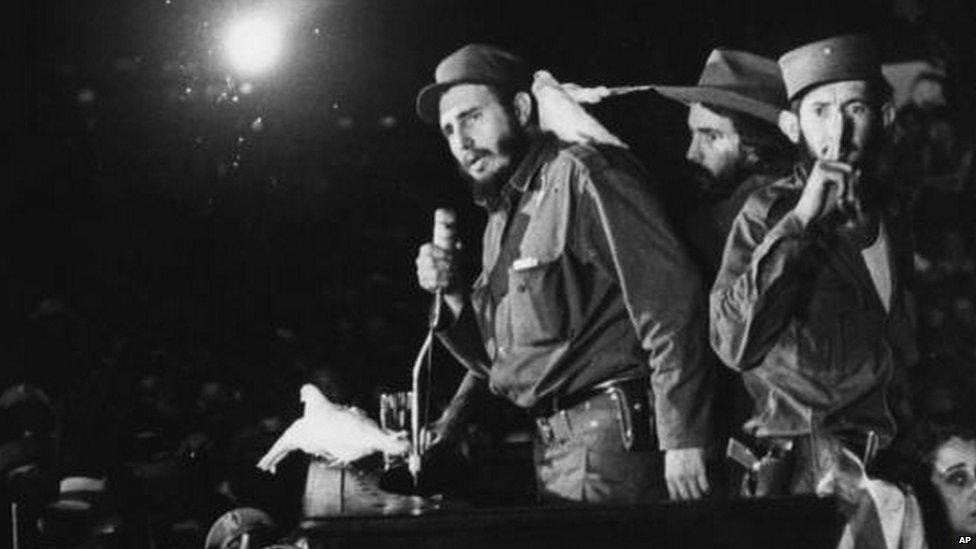
Fidel Castro speaking to supporters in the late 1950s
Now in his seventies, Elio Garcia remembers exactly where he was on 16 April 1961.
"At the corner of 23rd and 12th", he says, motioning up the street from his front porch in the Vedado district of Havana. "I was towards the back of the crowd but I remember it clearly."
Just two years after Fidel Castro's men had overthrown the country's military strongman, Fulgencio Batista, the fledgling Cuban Revolution was facing its biggest challenge yet: the invasion of the island by CIA-trained Cuban exiles at the Bay of Pigs.
Attending the funeral of those killed in the invasion's preliminary air raids, Castro made one of his most important speeches.
A 'difficult path'
Elio recites the crucial line: "They cannot forgive us for having made a socialist revolution right under the very noses of the United States!"
It was Castro's first public acknowledgement that the Cuban Revolution would be socialist - rather than just nationalist - in character.
"I was there, I saw it," exclaims Elio with a smile, momentarily transported back to an afternoon when, as a 20-year-old apprentice mechanic, he downed tools to watch the communist leader's address.
"That speech put us on a difficult path," he reflects, a committed revolutionary to this day.
As far as Washington was concerned, the island was now part of the Soviet Bloc.
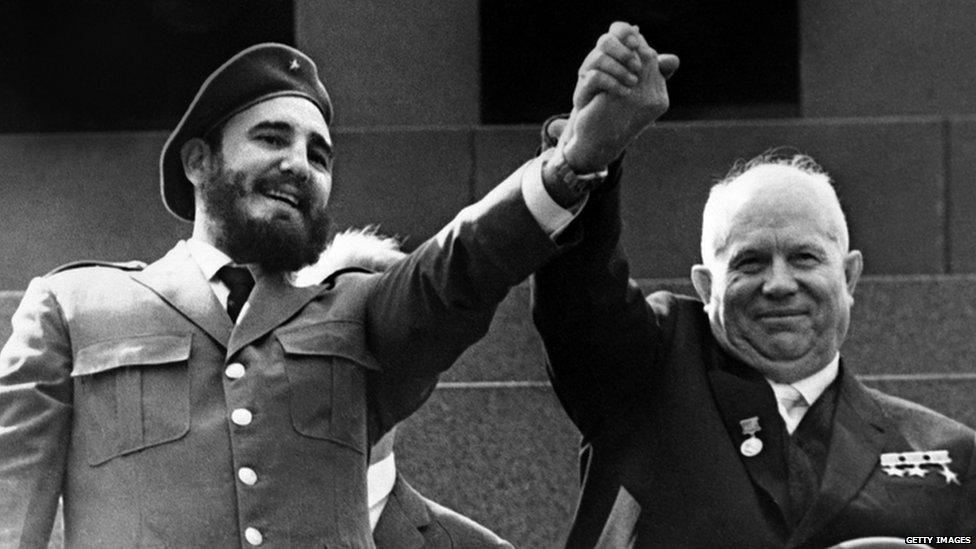
Fidel Castro and the Soviet Union leader Nikita Khrushchev in Moscow
President Dwight Eisenhower had broken off diplomatic ties a few months earlier and imposed the initial sanctions of an economic embargo.
But that was just the start.
For the next 55 years, Cuba would be regarded as a hostile neighbour, a threat just 150 kilometres (90 miles) off the coast of Florida.
That hostility reached its crescendo during the Cuban missile crisis, 13 tense days in October 1962, in which the presence of Soviet missiles on the island took the world to the brink of nuclear war.
Like many Cuban men his age, Elio can recall in minute detail each of those dramatic Cold War confrontations.
New era beckons
But for him, some things haven't changed since Eisenhower's day. He still lives in the same apartment and still does the same job. The US trade embargo is still in place too.
Yet there have been huge developments in the intervening years as well, of course, particularly over the past 12 months.
In December 2014 Presidents Raul Castro and Barack Obama announced their intention to re-establish diplomatic ties, probably the single most important event in US-Cuban relations since the fall of the Berlin Wall.
In a sense, it has ushered in a new era, diplomatically at least. Cubans and Americans no longer eye each other with the same suspicion.
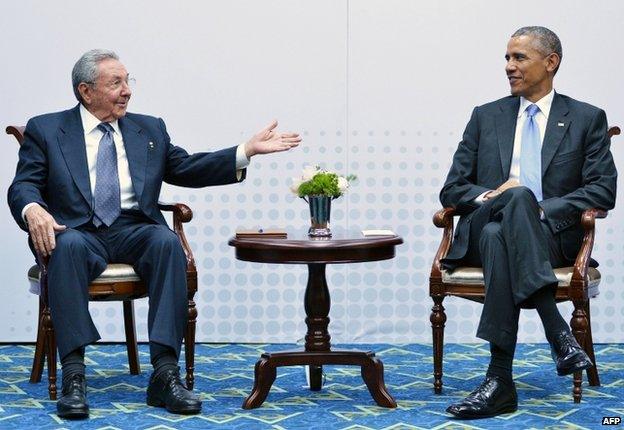
Raul Castro and Barack Obama met at a summit in Panama City in April 2015
Make no mistake, there has been no discernible change to the political system - nor is any great shift expected.
Immediately following the announcement, Raul Castro emphasised that the thaw with Washington would not affect the socialist ideals "for which our people have spilled so much blood and run such great risks".
But it is important not to see the diplomatic thaw in isolation.
In 2008 Fidel Castro, the man who had ruled over every facet of Cuban life, passed power to his younger brother Raul after a period of ill health. Within months, Raul began to ease some of the restrictions over the state-run economy.
There was economic necessity at play in that decision as well as political pragmatism.
Since then, small private businesses have cropped up all over Cuba, especially in the tourism sector, and thousands of workers have moved into self-employment.
The new diplomatic ties with the United States came as the island's economy had already begun to open up.
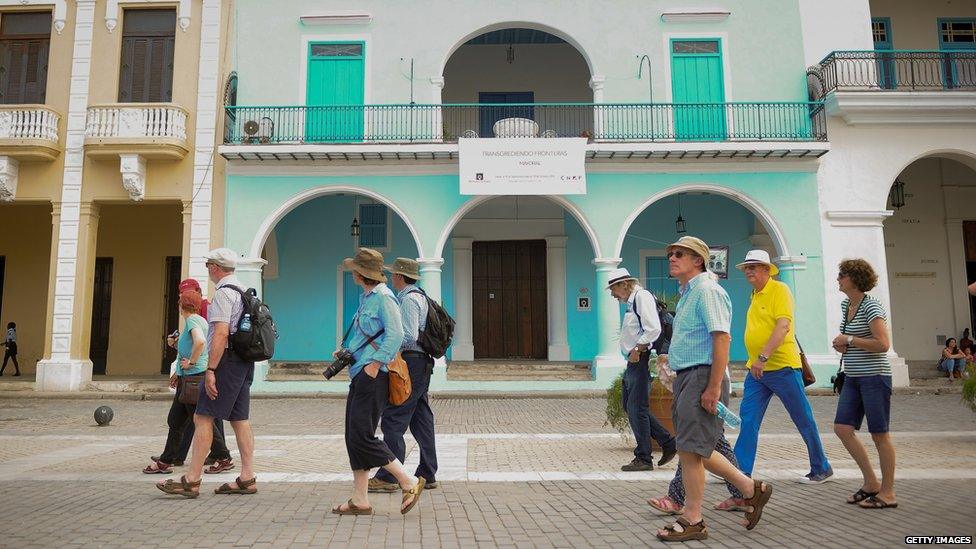
Tourist numbers from the US have been on the rise since the thaw between the two countries
US U-turn?
Obviously the thaw isn't universally supported in the US.
Republican presidential hopeful Ted Cruz has promised to reverse the Obama administration's overtures towards Havana and return to the policies of the past. Senator Marco Rubio did the same before his campaign came to end in Florida in March.
In sections of the media too, the process has its critics. The Washington Post recently spoke out firmly against the detente:
"There is scant evidence so far of a sea change in Cuba - perhaps because Mr Obama continues to offer the Castro regime unilateral concessions requiring nothing in return," the newspaper's editorial board wrote.
"Since the United States has placed no human rights conditions on the opening, the Castro regime continues to systematically engage in arbitrary detention of dissidents and others who speak up for democracy."
Others though, most notably the New York Times, have backed the thaw from the start. Editorials in newspapers aside, most ordinary Cubans are simply tired of the antagonism with the US and appear to welcome the new relationship.
The decision by President Obama and President Castro represents change, albeit one that might take time to trickle down to the streets. After almost six decades of stasis, any change is welcome.
Furthermore, the thaw goes beyond the political and economic spheres.
Disaster preparedness and the fights against human trafficking and drug smuggling are obvious areas of mutual interest. The previously estranged neighbours have also started to co-operate in the fields of science, technology, marine conservation, music and the arts.
Last year saw a sharp spike in tourists coming to Cuba, with a 54% rise in the number of American visitors after the Obama administration lifted several travel restrictions for US citizens.
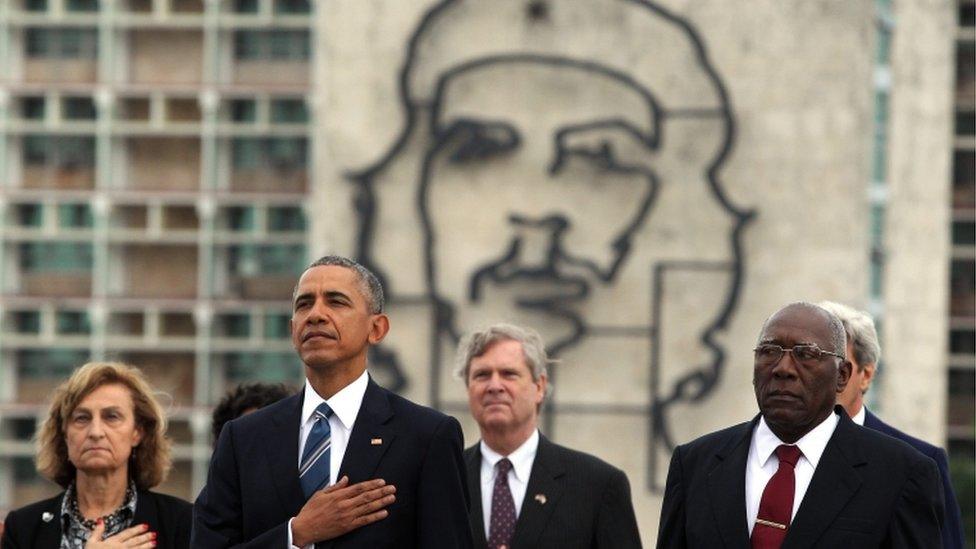
President Obama was the one of latest Americans to come, when he made the first visit by a sitting US president to Cuba in almost 90 years. The picture of him in Revolution Square was as iconic an image as has ever been taken on this much-photographed island - and overall the trip was a shot in the arm for the thaw.
"It's marvellous," says Elio Garcia of the presidential visit.
Ever the witness to history in his homeland, this is one moment Elio freely admits he never thought he'd live to see.
"This is a slow process and it takes time," he smiles. "This is just the start."